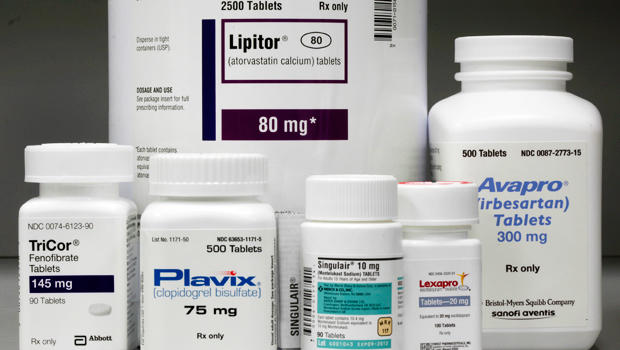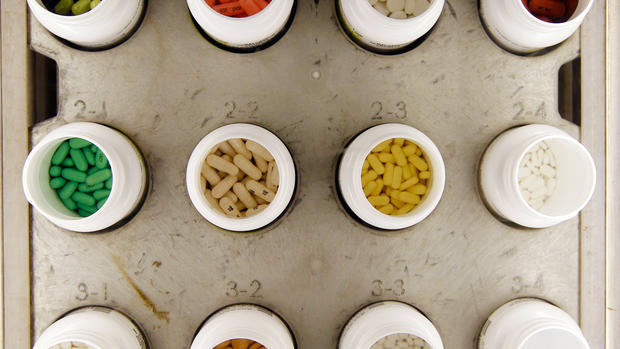Prescription drug prices set to fall as patents expire
(CBS/AP) Prescription drug prices may be sky-high now but are poised to fall dramatically.
PICTURES - Cheaper pills? 7 top-selling drugs set to go generic
In the next 14 months, seven of the world's 20 best-selling drugs are scheduled to go "off patent." As they do, the brand-name drugs will lose out to generic versions, cutting costs for patients and companies that provide health benefits.
Generic versions of big-selling drugs for high cholesterol, high blood pressure, asthma, diabetes, depression, high triglycerides, HIV/AIDS, and bipolar disorder also are on the way.
Generic medicines - chemically equivalent to the original brand-name drugs - typically cost 20 percent to 80 percent less than the brand names.
The flood of generics will continue for the next decade or so, as about 120 brand-name prescription drugs lose market exclusivity, according to prescription benefit manager Medco Health Solutions Inc.
"My estimation is at least 15 percent of the population is currently using one of the drugs whose patents will expire in 2011 or 2012," says Joel Owerbach, chief pharmacy officer for Excellus Blue Cross Blue Shield, which serves upstate New York.
The new generics will slice copayments of those with insurance. For the uninsured, who have been paying full price, the savings will be much bigger.
Last year, the average generic prescription cost $72, versus $198 for the average brand-name drug, according to consulting firm Wolters Kluwer Pharma Solutions. Those figures average all prescriptions, from short-term to 90-day ones.
Average copayments last year were $6 for generics, compared with $24 for brand-name drugs given preferred status by an insurer and $35 for nonpreferred brands, according to IMS Health.
For people with no prescription coverage, the coming savings on some drugs could be much bigger. Many discount retailers and grocery chains sell the most popular generics for $5 a month or less to draw in shoppers.The impact of the coming wave of generics will be widespread - and swift.
Insurers use systems that make sure patients are switched to a generic the first day it's available. Many health plans require newly diagnosed patients to start out on generic medicines. And unless the doctor writes "brand only" on a prescription, if there's a generic available, that's almost always what the pharmacist dispenses.
As the proportion of prescriptions filled with generic drugs jumped to 78 percent in 2010, from 57 percent in 2004, annual increases in prescription drug spending slowed, to just 4 percent in 2010. According to the Generic Pharmaceutical Association, generics saved the U.S. health care system more than $824 billion from 2000 through 2009, and now save about $1 billion every three days.
The savings are only going to get greater as our overweight population ages. People who take their medicines regularly often avoid costly complications and hospitalizations, says AARP's policy chief, John Rother, bringing the system even bigger savings than the cheaper drugs.
In addition, many patients taking a particular brand-name drug will defect when a slightly older rival in the same class goes generic.
For patients, it's a godsend.
Douglas Torok, 59, of Erie, Pa., now spends nearly $290 every three months for insulin for his Type 2 diabetes, plus four daily pills for his blood pressure and cholesterol problems. The $40,000-a-year foundry supervisor fears not being able to cover the out-of-pocket costs when he retires and doesn't have a generous prescription plan.
Once generic versions of his pills become available, his copayment will plunge from the current $1 per day for each.
"I will pay $16 for 90 days" for both, says Torok, who hopes to travel more. "It's a big deal for me on my income."

